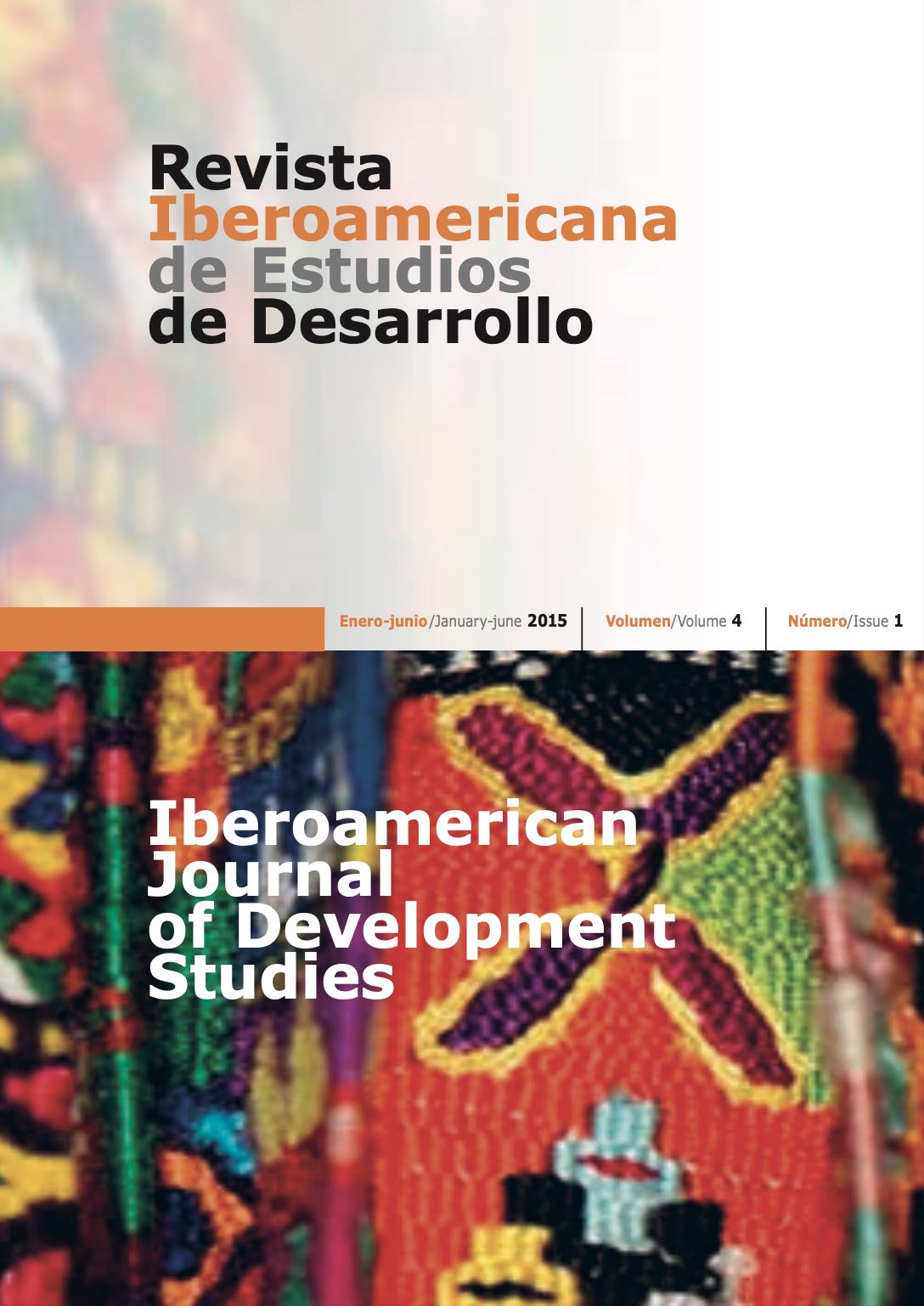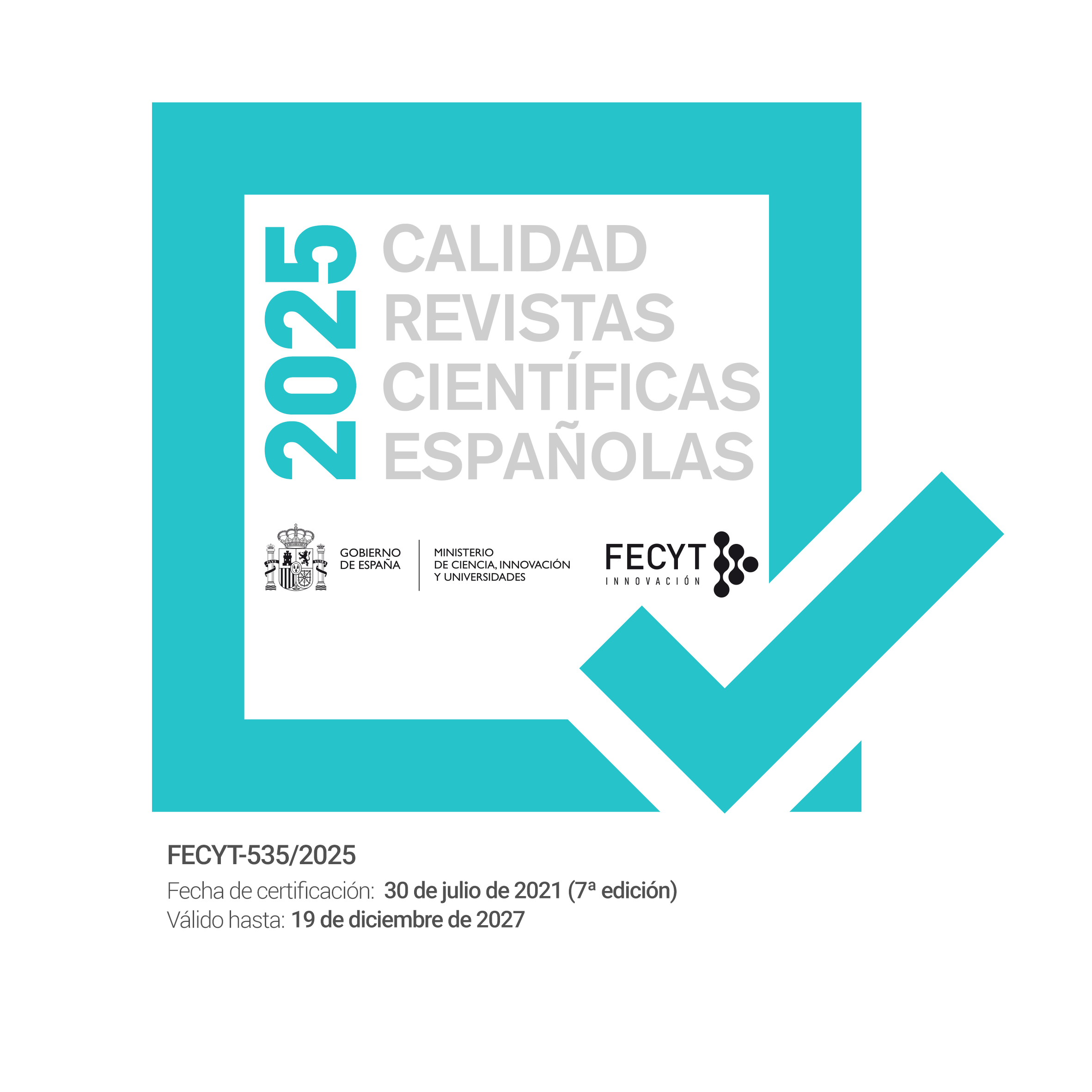The Lexicon of Development: A Quantitative History of the Language of Development Studies
DOI:
https://doi.org/10.26754/ojs_ried/ijds.120Palabras clave:
teoría del desarrollo, lenguaje, ngramsResumen
El objectivo de este artículo es examinar la historia del lenguaje de los estudios del desarrollo para explicar la naturaleza de su terminología. La historia de los principales términos de los estudios del desarrollo (desarrollo económico/sostenible/humano, Tercer Mundo, y Norte/Sur (Global)) se examina a través del estudio cuantitativo de la frecuencia del uso de esos términos durante el siglo XX. El estudio se apoya en una base de datos de millones de libros digitalizados facilitada por Google Books. El autor sostiene que los resultados del estudio proporcionan apoyo empírico al argumento que el lenguaje de los estudios del desarrollo es una construcción histórico-ideológica que forma parte de la estructura de la economía mundial.
Descargas
Referencias
ALKIRE S (2010). Human Development: Definitions, Critiques, and Related Concepts.OPHI Working Paper No. 36.
ARNDT HW (1981). Economic Development: A Semantic History. Economic Development and Cultural Change 29(3):457-466.
BANERJEE S (2003). Who Sustains Whose Development? Sustainable Development and the Reinvention of Nature. Organization Studies 24(1):143-180.
BERGER M (1994). The end of the Third World? Third World Quarterly 15(2):257- 275.
BLAIKIE P (2000). Development, post-, anti-, and populist: a critical review. Environment and Planning 32:1033-1050.
BRAUDEL F (1987). A History of Civilizations. Penguin, London.
CASTELLS M (1996). The Rise of the Network Society. Wiley-Blackwell, Essex.
CORBRIDGE S (1998). «Beneath the pavement only soil»: The poverty of post-development. Journal of Development Studies 34(6):138-148.
COWEN M, SHENTON R (1998). Doctrines of Development. Routledge, London.
CORNWALL A (2007). Buzzwords and fuzzwords: deconstructing development discourse. Development in Practice 17(4-5):471-484.
DIRLIK A (2007). Global South: Predicament and Promise. The Global South 1(1):12-23.
DIXON J, MARCHMAN V (2007). Grammar and the Lexicon: Developmental Ordering in Language Acquisition. Child Development 78(1):190-212.
ECKL J, WEBER R (2007). North: South? Pitfalls of Dividing the World by Words. Third World Quarterly 28(1):3-23.
EDWARDS M (1989). The Irrelevance of Development Studies. Third World Quarterly 11(1):116-135.
ESCOBAR A (1988). Power and Visibility: Development and the Invention and Management of the Third World. Cultural Anthropology 3(4):428-443.
ESCOBAR A (1991). Anthropology and the Development Encounter: The Making and Marketing of Development Anthropology. American Ethnologist 18(4):658-682.
ESTEVA G (1992). Development. In: Sachs, W (ed.). The Development Dictionary. Zed, London 6-26.
FERNANDO J (2003). The Power of Unsustainable Development: What is to be Done? The ANNALS of the American Academy of Political and Social Science 590:6-34.
FRANK AG (1969). América Latina: subdesarrollo o revolución. Era, México.
GRAMSCI A (1971). Selections from the Prison Notebooks. International Publishers, New York.
HABERMAS J (1984). The Theory of Communicative Action. Beacon Press, Massachusetts.
HAQUE M (1999). The Fate of Sustainable Development Under Neo-liberal Regimes in Developing Countries. International Political Science Review 20(2):197-218.
HARVEY D (1989). The Condition of Postmodernity. Blackwell, Oxford.
HARVEY D (2005). A Brief History of Neoliberalism. Oxford University Press, Oxford.
HARVEY D (2010). The Enigma of Capital. Oxford University Press, Oxford.
HODGSON G (2006). What Are Institutions? Journal of Economic Issues 40(1):1-25.
HOLLICH G, HIRSH-PASEK K, TUCKER M, KOLINKOFF R (2000). The Change is Afoot: Emergentist Thinking in Language Acquisition. In: Anderson, PB (Ed.). Downward Causation. Aahus University Press, Denmark.
HORKHEIMER M, ADORNO T (2002). Dialectic of Enlightenment. Stanford University Press, Stanford.
ICIDI (1980). North-South: A programme for survival. MIT Press, Massachusetts.
IRIYE A (1999). A century of NGOs. Diplomatic History 23(3):421-435.
IUCN (1980). World Conservation Strategy. data.iucn.org/dbtw-wpd/edocs/WCS-004.pdf , accessed 26 October 2012.
KIELY R (1999). The Last Refuge of the Noble Savage? A Critical Assessment of Post-Development Theory. The European Journal of Development Research 11(1):30-55.
LAL D (1983). The Poverty of «Development Economics». MIT Press, Massachusetts.
LÉLÉ S (1991). «Sustainable Development» A Critical Review. World Development 19(6):607-621.
LIN Y, MICHEL J-B, LIEBERMAN AIDEN E, ORWANT J, BROCKMAN W and PETROV S (2012). Syntactic Annotations for the Google Books Ngram Corpus. Proceedings of the ACL 2012 System Demonstrations, 169-174.
LUCKÁCS G (1968). History and Class Consciousness. MIT Press, Massachusetts.
MADDISON A (1989). The World Economy in the twentieth Century. OECD, Paris.
MAKKI F (2004). The empire of capital and the remaking of centre-periphery relations. Third World Quarterly 25(1):149-168.
MARTÍN RD, NOVAL BL (2012). La dimensión subjetiva en el estudio del desarrollo humano. Revista Iberoamericana de Estudios de Desarrollo 1(1):103-113.
MATTHEWS S (2004). Post-Development Theory and the Question of Alternatives: A View from Africa. Third World Quarterly 25(2):373-384.
MARX K (1970 [1844]). Critique of Hegel’s ‘Philosophy of Right.’ Cambridge University Press, Cambridge.
MARX K (1976 [1887]). Capital, A Critique of Political Economy, Volume 1. Penguin, London.
MEADOWS D, RANDERS J, MEADOWS D, BEHRENS W (1972). The Limits to Growth. Universe, New York.
MICHEL J, SHEN Y, AIDEN A, VERES A, GRAY M, THE GOOGLE BOOKS TEAM, PICKETT J, HOIBERG D, CLANCY D, NORVIG P, ORWANT J, PINKER S, NOWAK M, AIDEN E (2011). Quantitative Analysis of Culture Using Millions of Digitized Books. Science 331:176-182.
MINTZ S (1976). On the concept of a third world. Dialectical Anthropology 1(1-4):377-382.
MORSE S (2004). Putting the pieces back together again: an illustration of the problem of interpreting development indicators using an African case study. Applied Geography 24:1-22.
MORSE S (2008). Post-Sustainable Development. Sustainable Development 16:341-352.
MYRDAL G (1968). Asian Drama: An enquiry into the wealth of nations. Pantheon, New York.
MYRDAL G (1974). What Is Development? Journal of Economic Issues 8(4):729-736.
NORTH D (2005). Understanding the Process of Economic Change. Princeton University Press, New Jersey.
PAGE M (2003). Colonialism: An International Social, Cultural, and Political Encyclopaedia. ABC-CLIO, California.
PIERTERSE J (2000). After Post-Development. Third World Quarterly 21(2):175-191.
PRASHAD V (2007). The Darker Nations: A People’s History of the Third World. The New Press, New York.
QUILLIGAN J (2001). The Brandt Equation. Brandt21 Forum, Philadelphia.
REUVENY R, THOMPSON W (2007). The North-South Divide and International Studies: A Symposium. International Studies Review 9:556-564.
RIST G (2008). The History of Development: From Western Origins to Global Faith. Zed, London.
ROBINSON J (2004). Squaring the circle? Some thoughts on the idea of sustainable development. Ecological Economics 48:369-384.
ROSTOW WW (1969). The Stages of Economic Growth: A non-communist manifesto. Cambridge University Press, Cambridge.
SACHS W (1992). Introduction. In: Sachs, W (ed.). The Development Dictionary. Zed, London 1-6.
SAUVANT K (1981). The Group of 77: evolution, structure, organization. Oceana Publications, New York.
SAUVY A (1986 [1952]). Trois mondes, une planète. Vingtième Siècle. Revue d’histoire 12:81-83.
SCHUMPETER J (1934). The Theory of Economic Development. Transaction, New Jersey.
SEN A (1988). The concept of development. In Chenery, H, Srinivasan, T (eds). Handbook of Development Economics. Elsevier, Amsterdam 9-27.
SEN A (1999). Development as Freedom. Oxford University Press, Oxford.
SEERS D (1969). The Meaning of Development. International Development Review 11(4):1-28.
SIMON D (1997). Development Reconsidered; New Directions in Development Thinking. Geografiska Annaler. Series B, Human Geography 79(4):183-201.
SOUTH COMMISSION (1990). The Challenge to the South. Oxford University Press, Oxford.
STREET J (1987). The Institutionalist Theory of Economic Development. Journal of Economic Issues 21(4):1861-1887.
SUMNER A (2006). What Is Development Studies? Development in Practice 16(6):644-650.
SUMNER A, TRIBE M (2008). International Development Studies. Sage, London.
THOMAS A (2000). Development as practice in a liberal capitalist world. Journal of International Development 12:773-787.
TODARO M, SMITH S (2008). Economic Development. Pearson, Essex.
TOUSSAINT E (2008). The World Bank: A Critical Primer. Pluto, Toronto.
TUCKER V (1999). The myth of development: a critique of a Eurocentric discourse. In: Munck, R, O’Hearn, D (eds.). Critical Development Theory. Zed, London.
UNDP (1990). Human Development Report 1990. UNDP, New York.
UNDP (2004). Forging a Global South. UNDP, New York.
UNDP (2011). Human Development Report 2011. UNDP, New York.
UNITED NATIONS (1961). United Nations Development Decade. UN Documents. http://www.un.org/en/events/observances/decades.shtml , accessed 10 October 2012.
UNITED NATIONS (1970). International development strategy for the Second United Nations Development Decade. UN Documents. http://www.un.org/en/events/observances/decades.shtml , accessed 10 October 2012.
UNITED NATIONS (1974). Declaration on the establishment of a new international economic order. UN Documents. http://www.un-documents.net/s6r3201.html, accessed 10 October 2012.
UNITED NATIONS (1980). International development strategy for the Third United Nations Development Decade. UN Documents. http://www.un.org/en/events/observances/decades.shtml , accessed 10 October 2012.
UNITED NATIONS (1990). International development strategy for the Fourth United Nations Development Decade. UN Documents. http://www.un.org/en/events/observances/decades.shtml , accessed 10 October 2012.
UNITED NATIONS (2000). Millennium Declaration. UN Documents. http://www.un.org/millennium/declaration /ares552e.htm , accessed 10 October 2012.
VALENZUELA J, VALENZUELA A (1978). Modernization and Dependency: Alternative Perspectives in the Study of Latin American Underdevelopment. Comparative Politics 10(4):535-557.
VEBLEN T (1899). The Theory of the Leisure Class. Oxford University Press, Oxford.
WCED (1987). Our Common Future. Oxford University Press, Oxford.
WEBER H (2004). Reconstituting the ‘Third World’? Poverty Reduction and Territoriality in the Global Politics of Development. Third World Quarterly 25(1):187-206.
WENDT A (1987). The Agent-Structure Problem in International Relations Theory.International Organization 41(3):335-370.
WESTAD O (2005). The Global Cold War: Third World Interventions and the Making of our Times. Cambridge University Press, Cambridge.
WILLIAMS R (1958). Culture and Society. Chatto and Windus, London.
WILLIAMS R (1973). Base and superstructure in Marxist cultural theory. New Left Review 1(82):3-16.
WOLFE M (1996). Elusive Development. Zed, London.
WOLF-PHILLIPS L (1987). Why ‘Third World’?: Origin, Definition and Usage. Third World Quarterly 9(4):1311-1327.
Descargas
Publicado
Número
Sección
Licencia
Derechos de autor 2015 Christopher David Absell

Esta obra está bajo una licencia internacional Creative Commons Atribución-NoComercial-SinDerivadas 4.0.



